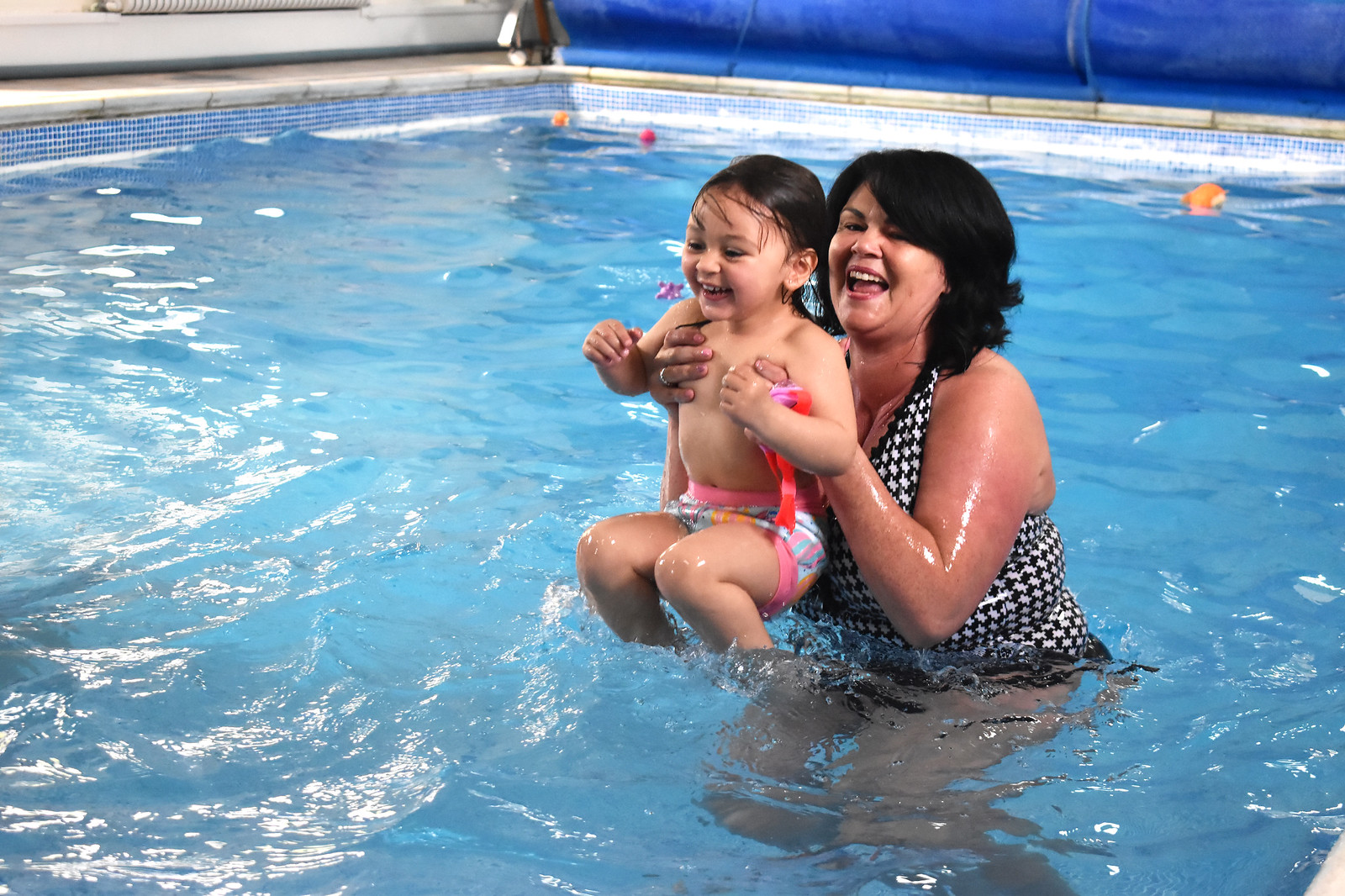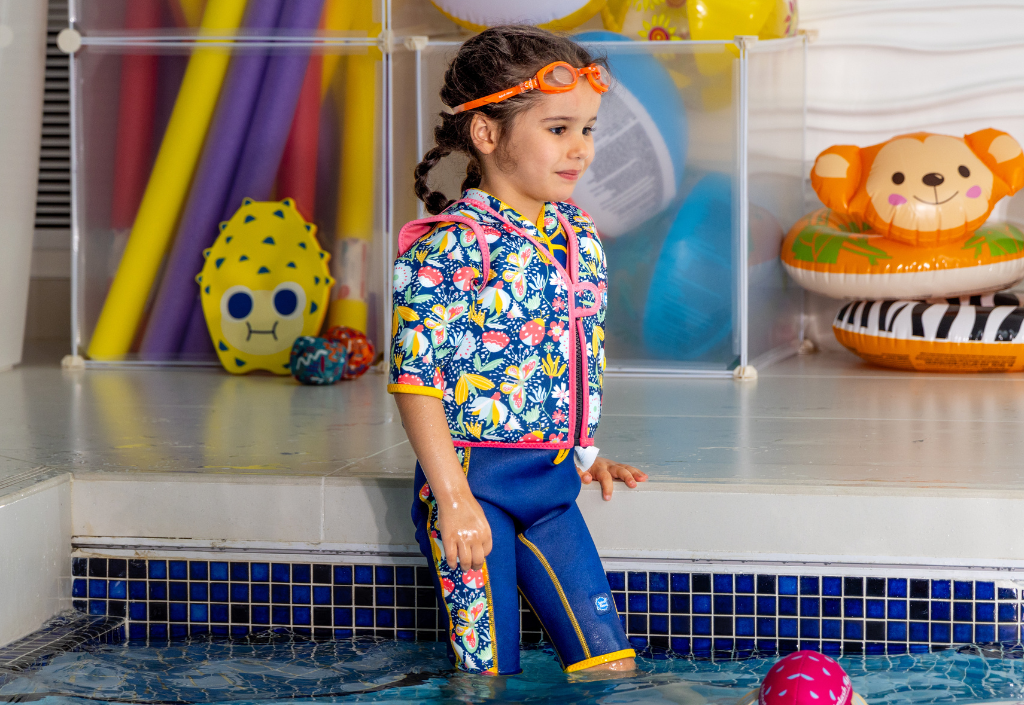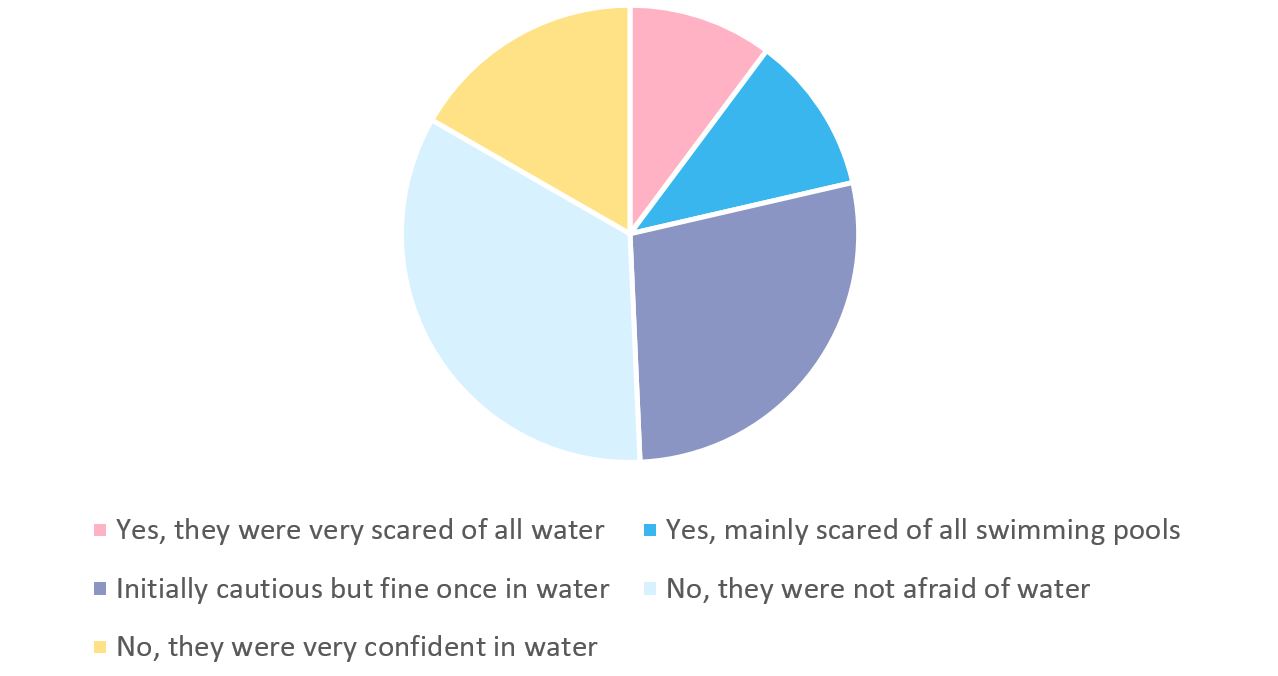Posted on 11th December 2018
Reviewed 10/01/2023
How to get young children past a fear of swimming
Even though swimming can be a joyous experience, it’s very common for infants to develop aquaphobia (fear of water) early on in life. A survey conducted by children and baby swimwear specialists Splash About revealed that only 16% of adults said their toddlers felt very confident in water.
From the age of eight months old, children can suddenly develop a hatred for swimming and a fear of being in the water, even if they had previously enjoyed the activity. This is widely known as the ‘water wobbles’ and is likely to occur when the infant has already had some lessons. Although this usually fades over time, aquaphobia can often prevent people from learning how to swim if it isn’t addressed. However, following some recommended steps can help lessen your child’s fear of water.
Bring in the experts
There are a variety of different approaches to carefully handle an infant’s aquaphobia. To find out how parents can best help their child overcome this fear, we decided to seek advice from the experts:
Bernadette Spofforth—Managing Director of Splash About
Noël Janis-Norton—Parenting author, coach and director of Calmer, Easier, Happier Parenting
Sally Baker—Author, speaker and therapist at Working on the Body
What is triggering the phobia?
Possible causes of aquaphobia among children:
- Fear of separation from their parents
- A parent unintentionally passing on their own aquaphobia
- Feeling overwhelmed by the noise, smell of chlorine and general activity in a swimming pool
- A dislike of getting wet, or a fear of water going in their eyes or nose
- Remembering a negative experience they have had in water previously
Having witnessed something upsetting while in water, or seen a distressing water-related scene on television
Bernadette: “If it isn’t already known, parents might find it useful to discover the cause of their child’s fear so they can better understand it.
“Knowing the trigger isn’t enough to diminish the phobia but it can help parents know what direction to go in to prevent the fear from being a lifelong issue.”
Noël: “An important thing to recognise is that children who become phobic of water or swimming are likely to have a relatively sensitive, intense, inflexible temperament to begin with.
“Most children don’t want to be scared but it’s out of their conscious control. Once it has become a phobia it’s irrational and it tends to persist, despite encouragement and well-meant lectures.
“I’ve known children who used to scream in terror at the sight of water who are now confident swimmers. A phobia need not be a life sentence but it does require careful handling.”
How can parents help?
Splash About’s study also showed that 10.2% of parents and carers said their infants were scared of all water and 11.2% were afraid of swimming pools. Once the cause of the phobia is established, parents should consider ways to help their children become more confident and relaxed in the water.
Sally: “You are teaching and letting them experience something wonderful and potentially lifesaving. There’s no rush.
“It’s important to take any pressure off and make all swimming pool visit as enjoyable as possible without cajoling the child to endure anything they’re not ready to do.”
Noël: “I recommend parents use systematic desensitisation, which is a method for gradually getting someone used to something that they want to avoid.
“The parents and the child together map out a lot of little steps between where the child is now, with the phobia, and where you want them to end up, which is with no fear whatsoever. At first, the steps will probably be very small.
“One benefit of doing this process really gradually is that the child is likely to become increasingly brave, confident and proud of himself. He becomes excited about completing the steps, possibly even keen to skip over a few of the steps and tackle something a bit harder.
“If parents try to rush it by making the steps too large, then the child will probably rebel and it will end up taking a lot longer to overcome the fear.”


Support and understand
Before gradually introducing the child to swimming pools, it can be beneficial to get them used to water in general with baths or paddling pools, so that they no longer associate water with fear.
Bernadette: “Acknowledge and accept their fear and don’t push them into doing something they aren’t ready for. It’s important that they trust you in the water so don’t trick them. Let them strike an interest in swimming on their own and move at their own pace.
“Refrain from showing any judgement or overreacting as this can cause stress and fuel the phobia. Instead, validate how they are feeling and remain calm.”
Consider the surroundings
Some children might find the idea of swimming scarier than the actual experience and it’s recommended that, as parent, you address your child’s fear before entering the water.
The child should feel relaxed and positive when swimming and not anxious or frightened, otherwise the fear will continue to grow. To get them used to the environment before swimming, sit near the pool with them and observe the surroundings.
Once your child is comfortable, encourage them to play with some water toys while sitting on the side-lines and, if they are ready to, paddle in the water. Splash About found in its research that 27% of toddlers were initially cautious about the water but fine once they got into the pool.
Sally: “All of a swimming pools noises, crowdedness and even water and ambient temperature will impact on the level of nervousness a child will experience.
“A swimming pool’s environment can seem very strange and alien to a young child and all of their reactions are completely normal and understandable as they acclimatise to this new experience.”
Choose a suitable class
If the infant takes part in group classes, consider whether the fear is linked to social anxiety and if one-to-one lessons with a teacher could reduce some pressure.
It’s also important to check that the teacher’s methods are right for your child, to ensure they will have a positive experience. While your child is still getting used to the idea of swimming, keep the lessons between 20 and 30 minutes.
Bernadette: “When they are ready to begin swimming, a smaller pool with fewer people could be more suitable for children who are likely to be intimidated by a busy space.”
Motivational tactics
If you’re afraid or uncomfortable in a pool, try not to show this when near your child because they might mimic your actions. By appearing calm and happy in the water, you encourage your child to relax.
It could also be motivating to set realistic goals for your child each lesson, and to acknowledge their bravery by rewarding them with a treat if they achieve their aims.
Noël: “Most children are motivated to overcome their fears by the promise of rewards but some aren’t. If your child is, then by all means give them an incentive.
“But the reward must be achievable without too much effort or courage. Make sure you’re not hoping for too much too soon.”
Floats and swimwear
Using float jackets, swim vests or float suits to begin with can help the child feel safe and at ease. However, don’t use them too long in case your child becomes dependent on the devices to feel secure in the water.
Bernadette: “Choosing colourful and bright swimwear that the child will be excited to wear can encourage them to enjoy swimming. Comfortable swimsuits can also make them feel calm and at ease.”
Sally: “Allowing them to choose the colour of their costume or the colour of their goggles or floats increases the control a child can feel in this new situation. It empowers them and reinforces their sense of influence and control, which can help them feel less overwhelmed.
“Comfortable swimwear and a swimming costumes with integral floats or inflatable arm bands all help a child feel more confident in the water.”


Have you experienced a baby/toddler in your care feeling scared of being in water?


| Yes, they were very scared of all water | 10.2% |
| Yes, mainly scared of swimming pools | 11.2% |
| Initially cautious but fine once in water | 27.9% |
| No, they were not afraid of water | 34% |
| No, they were very confident in water | 16.7% |
